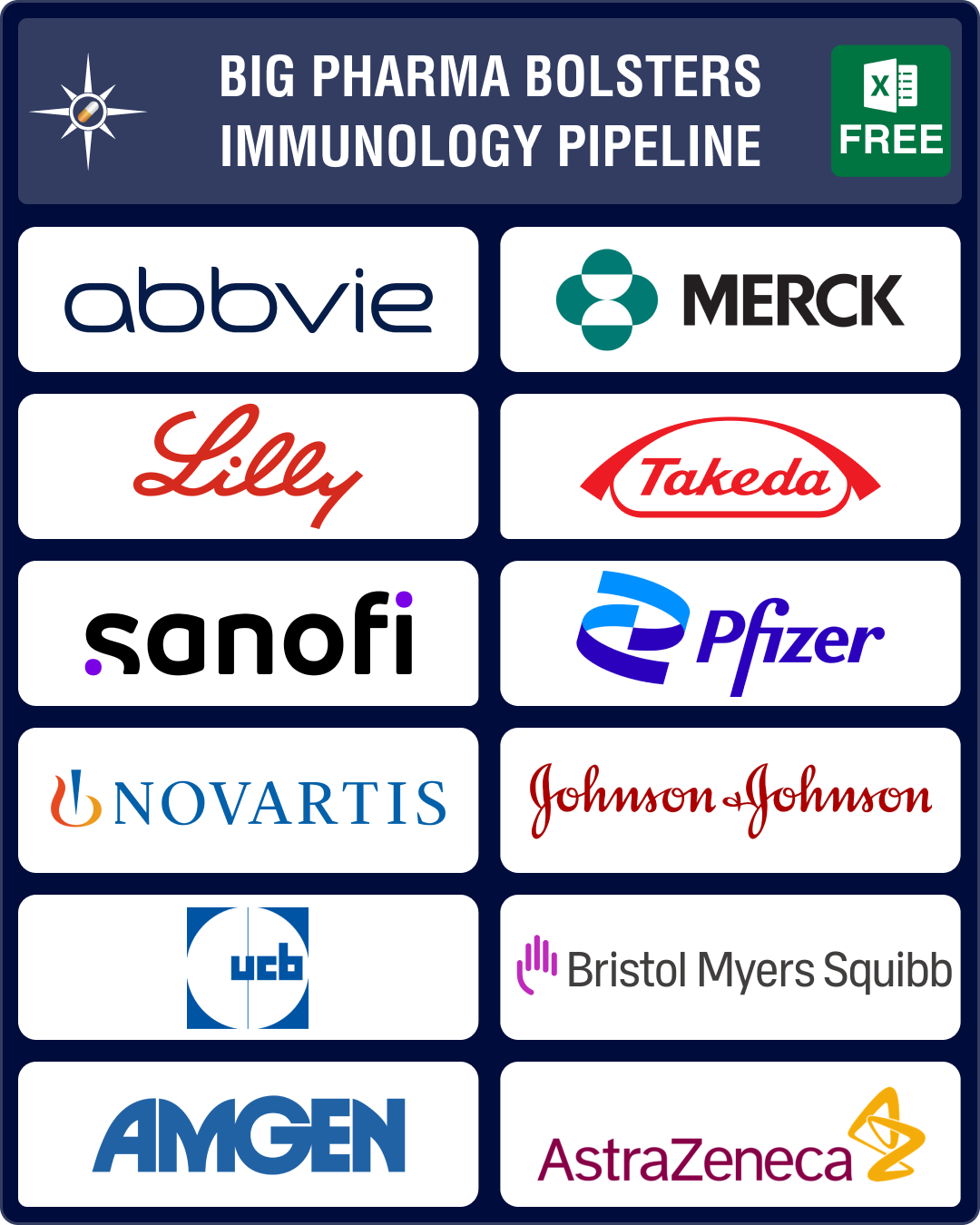
By PharmaCompass
2023-07-20
Impressions: 2584
Immunology, or the study of diseases caused by disorders of the immune system, is a field that is witnessing breakthroughs, and growing at a healthy rate. The global immunology drugs market was valued at US$ 97.93 billion in 2021 and is expected to reach US$ 184.21 billion by 2029.
Immunology drugs are used to combat infections and prevent or treat certain type of inflammatory diseases such as plaque psoriasis, atopic dermatitis, ulcerative colitis, diabetes mellitus type 1 and rheumatoid arthritis. Top companies in the segment include AbbVie, Johnson & Johnson (J&J), Roche, Amgen, Sanofi, Pfizer, Novartis, Merck and Eli Lilly.
Access the Immunology Newsmakers Dashboard (Free Excel)
Merck, Takeda, Sanofi, Lilly spend billions to bolster their immunology pipeline
This year, the field of immunology has seen considerable dealmaking activity. In April, Merck acquired San Diego-based Prometheus Biosciences in an all-cash deal worth US$ 10.8 billion. Merck sees promise in Prometheus’ pipeline candidate PRA023 that is in clinical trials to treat two inflammatory bowel diseases (IBDs) — ulcerative colitis (UC) and Crohn’s disease (CD).
Large drugmakers have acquired smaller players for their immunology pipelines. For instance, Sanofi acquired Provention Bio for US$ 2.9 billion in March to gain Tzield, the first and only therapy approved by FDA to delay the onset of stage 3 type 1 diabetes (T1D) in adults and pediatric patients. Similarly, in June Eli Lilly announced the acquisition of Dice Therapeutics for around US$ 2.4 billion. The deal will grant Lilly access to Dice’s oral lead drug candidates — DC-806 and DC-853 — for psoriasis and a variety of autoimmune and inflammatory diseases. And in December 2022, Takeda had acquired US-based Nimbus Lakshmi, a subsidiary of Nimbus Therapeutics, for US$ 6 billion to gain its phase 2 plaque psoriasis oral drug candidate TAK-279.
Access the Immunology Newsmakers Dashboard (Free Excel)
Several biosimilars take on Humira in US; AbbVie to focus on Skyrizi, Rinvoq
AbbVie’s blockbuster drug Humira posted sales of US$ 21.2 billion in 2022. However, its revenues are slated to drop sharply due to an onslaught of biosimilars. First off the block was Amgen with its Humira biosimilar. And this month, several drugmakers including Boehringer Ingelheim, Sandoz, Celltrion Healthcare, Organon, Samsung Bioepis, Coherus, Fresenius, and Biocon Biologics introduced Humira biosimilars in the US. Boehringer’s Cyltezo has become the first and only FDA-approved interchangeable biosimilar to Humira in the US.
AbbVie is now focusing on its two new drugs — Skyrizi and Rinvoq. The latter received its seventh FDA approval in May as the first oral treatment in patients with moderate to severe CD. Currently, the drug is in phase 3 trial for systemic lupus erythematosus (a common type of lupus) and phase 2 for hidradenitis suppurativa (a painful skin condition).
Skyrizi, a drug approved for multiple inflammatory diseases such as psoriasis, psoriatic arthritis, and CD, recently achieved positive phase 3 results in treating UC.
Access the Immunology Newsmakers Dashboard (Free Excel)
First cell therapy for type 1 diabetes okayed; Ionis holds trial for antisense med
Recent advancements in immunology bring hope for patients. For instance, UCB’s Rystiggo — a monoclonal antibody injection — to treat generalized myasthenia gravis (an autoimmune, neuromuscular disease) was approved by the US Food and Drug Administration (FDA) last month.
Similarly, cell and gene therapies are making news in the treatment of diabetes. Last month, FDA approved CellTrans’s Lantidra, the first-ever cell therapy for T1D. And AstraZeneca signed a license agreement worth around US$ 2.1 billion last month with Quell Therapeutics to develop multiple engineered T-regulatory cell therapies for the treatment of T1D and IBDs. Moreover, a Swedish biotech company — Diamyd Medical — is holding phase 3 trials for its T1D vaccine.
Antisense medicines that rely on a technology that targets RNA are also showing promise. Ionis Pharmaceuticals is conducting phase 3 trials for Donidalorsen, an antisense medicine for hereditary angioedema (a condition that affects blood vessels and can lead to rapid swelling of limbs, face, trachea etc).
Access the Immunology Newsmakers Dashboard (Free Excel)
New treatment options such as JAK inhibitors, S1P modulators hold promise
The cytokine network in our body participates in the modulation of the immune system. In autoimmune diseases, an abnormal production of pro-inflammatory cytokines, or a reduced inhibition of their actions, leads to an imbalance. New classes of drugs, such as cytokine inhibitors (including tumor necrosis factor alpha or TNF-alpha inhibitors ), janus kinase (JAK) inhibitors and sphingosine-1-phosphate (S1P) modulators, are providing new treatment options to patients.
Sanofi/Regeneron’s Dupixent, Novartis’ Cosentyx, and UCB’s Bimzelx represent significant advancements in cytokine inhibition. Currently approved in six immunological indications and under investigation for seven new inflammatory indications, sales of Dupixent are expected to reach €10 billion (US$ 11.0 billion) this year.
Another promising cytokine inhibitor is Novartis’ Cosentyx — it recently obtained EU approval to treat moderate to severe hidradenitis suppurativa (a painful skin condition). Currently, the drug is in phase 3 trials for lupus nephritis and giant cell arteritis (an inflammatory disease affecting the large blood vessels of the scalp, neck and arms). With sales of US$ 2.34 billion in H1 2023, Cosentyx effectively addresses six different inflammatory conditions. However, a competitor drug — UCB’s Bimzelx — has demonstrated superior efficacy due to its highly specific target.
Similarly, JAK inhibitors hold immense potential and can even replace some TNF-alpha inhibitors as they offer targeted oral therapy with comparable efficacy and a similar safety profile. These include Pfizer’s Cibinqo, Priovant Therapeutics’ brepocitinib and Ventyx Biosciences’ VTX958.
Pfizer’s etrasimod, an oral S1P modulator, is under review for ulcerative colitis and FDA is expected to take a decision in the second half of 2023. If approved it would help Pfizer challenge BMS’ Zeposia (ozanimod), the first and only approved oral S1P modulator for ulcerative colitis. Etrasimod is also in trials for CD.
Access the Immunology Newsmakers Dashboard (Free Excel)
Our view
New drugs and advancements in immunology, coupled with the rise in awareness about immunological disorders and cheaper availability of drugs, such as biosimilars, have created a conducive environment for the growth of immunology drugs. We see the immunology landscape changing considerably over the next five years.
The PharmaCompass Newsletter – Sign Up, Stay Ahead
Feedback, help us to improve. Click here
Image Credit : Immunology Newsmakers by PharmaCompass license under CC BY 2.0
“ The article is based on the information available in public and which the author believes to be true. The author is not disseminating any information, which the author believes or knows, is confidential or in conflict with the privacy of any person. The views expressed or information supplied through this article is mere opinion and observation of the author. The author does not intend to defame, insult or, cause loss or damage to anyone, in any manner, through this article.”








